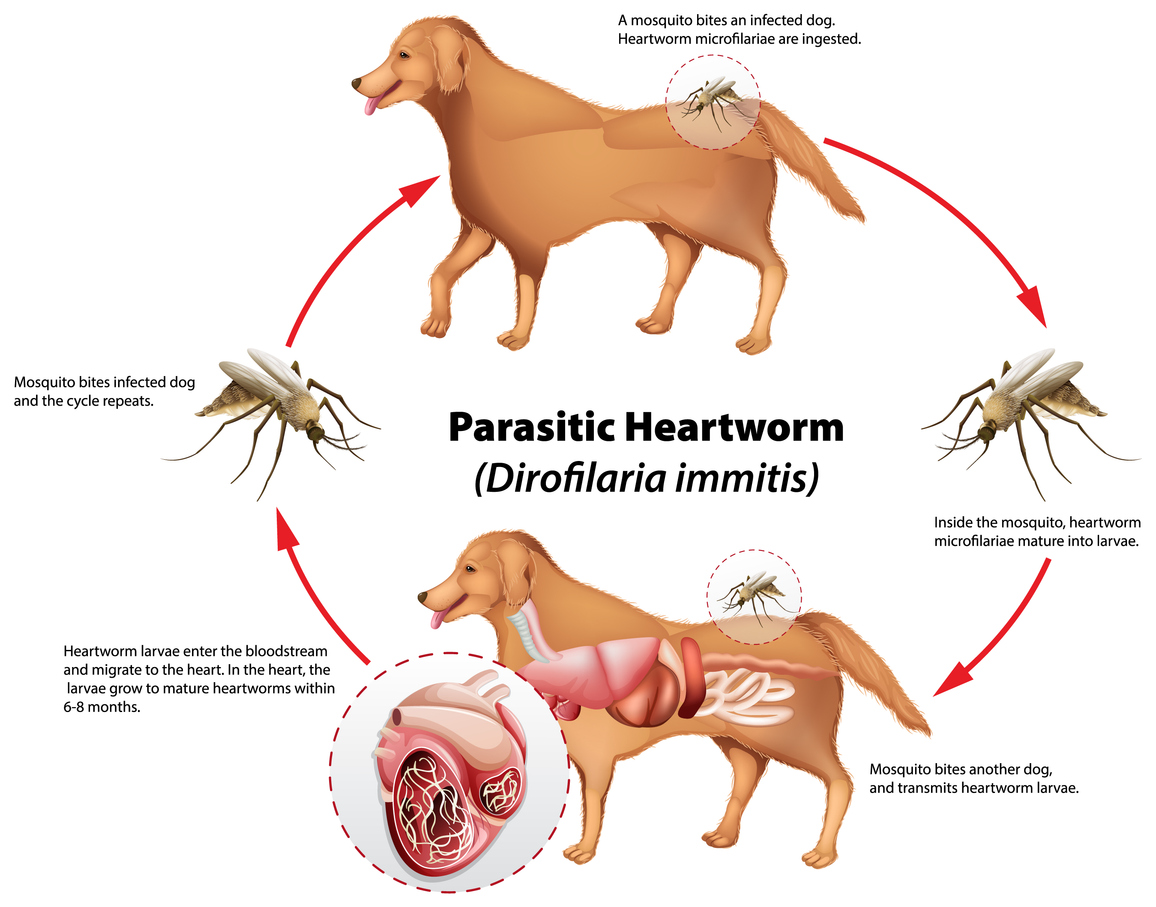At Braescroft Animal Clinic, we believe that the best medicine is prevention, especially regarding serious threats like heartworm disease. Living in Houston means warm weather almost year-round, and while that is great for outdoor adventures, it also creates the perfect environment for mosquitoes to thrive. Unfortunately, that makes heartworm disease a real risk for pets in our community. This article will explain how heartworm prevention can save your pet’s life and why it should be a regular part of their care routine.
Understanding Heartworm Disease

Heartworm disease is a potentially fatal condition caused by parasitic worms that live in infected animals’ heart, lungs, and blood vessels. It is transmitted through mosquito bites, which makes every indoor or outdoor pet vulnerable.
When a mosquito carrying heartworm larvae bites your pet, the larvae enter the bloodstream and begin to grow. Over several months, they can mature into adult worms, growing up to 12 inches in length. These worms interfere with the function of vital organs and, if untreated, can lead to heart failure, lung disease, and even death.
Dogs are the most common hosts, but heartworms can also affect cats and ferrets. Although cats typically carry fewer worms, even one can cause significant complications. Because symptoms often take time to appear, early detection and heartworm prevention are essential to keeping your pet safe.
Recognizing the Signs of Heartworm Disease
Heartworm disease is often known as a “silent” condition because the symptoms may be mild or unnoticed until it has progressed.
Signs in Dogs:
- Persistent cough
- Fatigue after mild activity
- Decreased appetite
- Weight loss
- In severe cases, heart failure or a swollen abdomen
Signs in Cats:
- Coughing or asthma-like symptoms
- Vomiting
- Loss of appetite
- Difficulty walking, seizures, or sudden collapse
Signs in Ferrets:
- Weight loss and reduced appetite
- Weakness in the hind legs
- Swollen abdomen
- Dark-colored urine
If your pet shows any of these signs, contact Braescroft Animal Clinic immediately for testing and care.
Diagnosing and Treating Heartworm Disease
Our team uses a combination of diagnostic tools to determine if your pet has heartworm disease:
- Blood tests to detect heartworm proteins or microfilariae (immature larvae)
- X-rays to evaluate the condition of the lungs and blood vessels
- Ultrasound to examine the heart and detect adult worms
For Dogs:
Treatment involves a careful, multi-step process:
- Stabilization for pets showing advanced symptoms
- Medications to kill adult heartworms
- Strict rest during and after treatment
- Follow-up care to confirm the infection has cleared
For Cats and Ferrets:
Currently, no approved drug to eliminate adult heartworms in cats or ferrets exists. Instead, treatment focuses on:
- Managing symptoms with medications
- Supportive care such as oxygen therapy
- Ongoing monitoring through imaging and lab tests
This is why heartworm prevention is always the safest and most cost-effective option.
Why Heartworm Prevention Is Essential

The good news is that heartworm disease is almost entirely preventable. Consistent, year-round heartworm prevention is the best way to protect your pet.
Here is how to stay ahead of the disease:
- Monthly Preventative Medications
These stop heartworm larvae before they become adult worms. Options include chewable tablets, topicals, or long-acting injections prescribed by your veterinarian.
- Annual Heartworm Testing
Even pets on preventive medications should be tested yearly to ensure the protection is working properly.
- Mosquito Control
Reduce mosquito exposure by eliminating standing water, using screens on doors and windows, and applying vet-approved mosquito repellents.
At Braescroft Animal Clinic, we tailor heartworm prevention plans to suit each pet’s unique needs and lifestyle.
Prescription Requirement for Preventatives
According to the American Veterinary Medical Association (AVMA), heartworm prevention products require a prescription to ensure their safe and effective use. Giving preventatives to an already-infected pet could lead to serious complications. That is why we recommend annual testing before starting or continuing heartworm prevention.
Missing even one monthly dose can leave your pet unprotected, so sticking to a consistent schedule is essential.
Partner with Braescroft Animal Clinic for Heartworm Protection

At Braescroft Animal Clinic, your pet’s health is our top priority. With Houston’s mosquito-friendly climate, heartworm prevention is not just recommended—it is essential. We are here to provide trusted guidance, expert testing, and reliable preventatives to help your pet live a long, healthy life.
Let us work together to keep your pet protected year-round. Contact us today to schedule a heartworm test, refill your pet’s prevention medication, or ask about starting a plan that fits your pet’s lifestyle.
Braescroft Animal Clinic
9643 Hillcroft St.
Houston, TX 77096
(713) 721-8081




